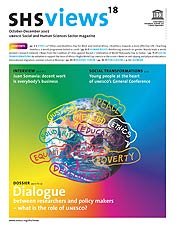| |
 |
 |
|
 |
 |
| SHSviews 18 |
| |
| UNESCO Social and Human Sciences Sector Magazine |
 |
| Dossier: The dialogue between researchers and policy makers: what is the role of UNESCO? / Interview with Juan Somavia: “Decent work is everybody's business” / Social Transformations: Young people at the heart of UNESCO’s General Conference – October-December 2007 (English | Français | Español | Русский) |
 |
 The world moves, UNESCO too The world moves, UNESCO too
“We provide a unique international platform where governments, researchers and civil society come together to cast words into action.”
As UNESCO prepares for the 34th session of the General Conference at its Paris Headquarters, another international event in France is also drawing the world’s attention – the 6th Rugby World Cup. Confined for a long time to a select few countries, this sport has grown to global proportions to encompass all continents today. While the spirit of the game has remained the same, the sport itself has undoubtedly evolved; new rules have been introduced and new traditions formed.
One can see similar dynamics in the history of UNESCO. The ideals and aspirations for which the Organization was established over sixty years ago remain as relevant today as ever before, but the continuous transformation of the political, economic and social realities has necessitated a periodic reevaluation of UNESCO’s priorities and strategies of action. The participation of the Sector for Social and Human Sciences in the World Sports Forum, which is being held in tandem with the Rugby World Cup and features debates on issues affecting sports today such as doping, racism, gender equality and globalization, is an indicator that the Sector is keeping well abreast of the evolving societal challenges around the world.
UNESCO is at the forefront of safeguarding humanity’s common tangible and intangible heritage, but is equally, and inseparably, forward-looking. The belief in an achievable better future brings the Member States together at the upcoming General Conference to agree upon a programme and budget for the next biennium and a new medium-term strategy for the next six years.
This will be an important occasion to evaluate our success in meeting the objectives set six years ago and, taking into account the lessons learned, to align the future work of the Organization with the priority needs of the Member States. Within broadly unchanged key priorities, SHS will be committed to a stronger focus on rigorous knowledge for effective action and on improved cooperation with other UNESCO programmes.
The Sector has a special duty to keep pace with the rapidly transforming social realities and the newly emerging policy challenges. As you will see from the dossier of this issue, UNESCO’s MOST programme serves as a forum for ideas generated in policy institutes, think tanks, academic establishments and governments around the world, and facilitates the translation of these ideas into effective policy applications. In this capacity, we provide a unique international platform where governments, researchers and civil society come together to cast words into action and shape abstract ideas into concrete policy solutions.
Our commitment to communicate effectively with you about the activities of the Sector has become an integral part of our future strategy. Gradual change in the content, style, – and name – of the SHSviews magazine responds to this commitment. But we can and will improve further. The next issue of the SHSviews magazine, which will come out in January 2008, will have a new structure, reflecting the SHS strategic programme objectives for 2008-2013, and will offer new features and more space for readers’ views.
Pierre Sané
Assistant Director-General
for Social and Human Sciences
This issue of SHSviews covers topical issues from October to December 2007:- Dossier: The dialogue between researchers and policy makers: what is the role of UNESCO?
Today’s policy makers face the difficult task of tackling complex issues in a rapidly changing social environment. Whether it is meeting internationally agreed human development objectives, such as the Millennium Development Goals, or coping with the challenges of fast-paced social transformations, policy makers increasingly rely on the knowledge and expertise generated in academic research communities. Conversely, social scientists and researchers depend on feedback from policy makers to make sure that their work remains relevant to the real-world issues that affect their communities. Unfortunately, dialogue between these two worlds does not occur naturally, as demonstrated by the vast archive of ineffective policies designed in total disregard for existing social science knowledge. UNESCO, with its unique intellectual mandate, has taken up the task of bringing together researchers and policy makers in order to build the capacities of Member States to meet their core responsibility of ensuring the welfare of their citizens. The initiative is called the Management of Social Transformations, or MOST for short, and it is carried out by the Social and Human Sciences Sector. More … [PDF]
- Interview with Juan Somavia: “Decent work is everybody's business”
As the 20th International Day for the Eradication of Poverty is celebrated on October 17 2007, the Director General of the International Labour Organization stresses the challenge of making work decent for all. According to him, the international labour crisis is one of the greatest current security threats and should be everybody’s business. More … [PDF]
- Social Transformations: Young people at the heart of UNESCO’s General Conference
In order to narrow the gap between young people and an international organization as complex as UNESCO, with its numerous partners and networks, constant efforts are necessary. The UNESCO Youth Forum, which is an integral part of the General Conference, and regional youth forums are a necessary part of this process. More … [PDF]
Also in SHS Views N° 18 [PDF]:
|
 |
 |
 Email this page Email this page  Printable version Printable version
|
 |
|
|


